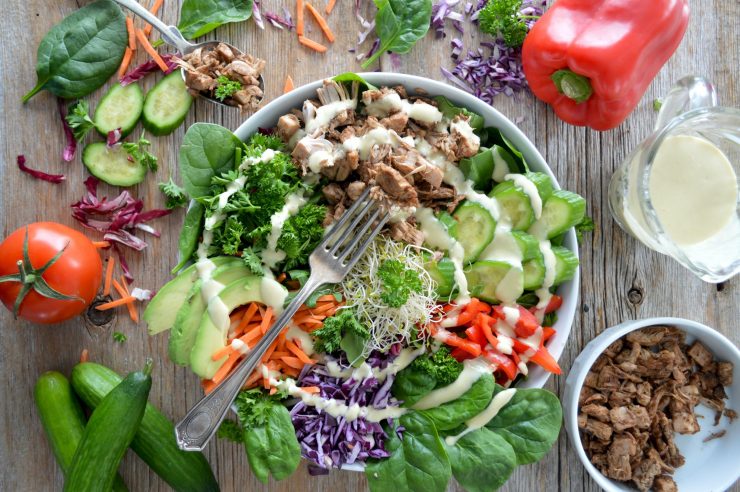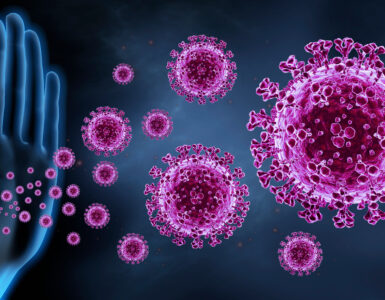By: Elísa Viðarsdóttir and Margrét Lára Viðarsdóttir
Nutrition and mental health are among the most important issues in the world these days. We usually decide for ourselves what we eat and how we think, which is why it is so important to have positive energy or weapons in our arsenal to tackle difficult circumstances.
A varied diet, in reasonable amounts, is good for the body and soul. Non-processed foodstuffs such as vegetables, fruit, fish, meat, cereals, beans and lentils are a fantastic source of good nutrients. A varied diet ensures that the body receives the nutrients that it needs to promote good health and thereby lessen the likelihood of a number of diseases. Food, or rather mealtimes, also play an important social role. As a result, it is important to have a healthy relationship with food – a varied, healthy diet while still allowing yourself to step outside the box every now and then.
 The lives led by flight crews, shift workers and people who have to travel a great deal for their work can differ significantly from the lives of the general citizen who works from 8–16, five days a week. All the same, flight crews / travellers and shift workers do need to try to keep to regular mealtimes and minimise added sugar in their food as far as possible. It is important to try to maintain a routine or maintain stability during time off as far as possible and to use such time in a positive and constructive manner to exercise and think about one’s health.
The lives led by flight crews, shift workers and people who have to travel a great deal for their work can differ significantly from the lives of the general citizen who works from 8–16, five days a week. All the same, flight crews / travellers and shift workers do need to try to keep to regular mealtimes and minimise added sugar in their food as far as possible. It is important to try to maintain a routine or maintain stability during time off as far as possible and to use such time in a positive and constructive manner to exercise and think about one’s health.
There is often little time for nourishment when people need to wake up very early in the morning. Sometimes people even feel that they must skip a meal during the course of the day and then, to make up for it, eat a large meal instead when they have time, more often than not late in the evening. This is a description that many who travel or work shifts recognise rather too well. A varied diet helps to keep blood sugars in balance which again focuses concentration and can have an effect on reactions, which can be useful when needed. As humidity during flights is very low, it is necessary for the crew to use water as their main source of a refreshing drink, drink a significant volume of water and minimise sugary drinks and coffee.
SOME GOOD ADVICE REGARDING DIET:
What can I do to be able to eat regularly and ensure a varied and nutritious diet?
Be organised: It is a good idea to organise your time and try to grab a healthy and nutritious meal with you if it is likely that you will not have time for nourishment. You could, for instance, cook a larger meal the evening before a flight and put the leftovers in a box to take with you the next day.
Eat regularly: Small, nutritious snacks between meals are a good option. It is far too easy to turn to the next vending machine to buy sugared soda drinks and crisps, but it is a better idea to choose the healthier option and get nuts, fruit or skimmed yoghurt products. This prevents us from eating over-large meals or craving sugar-rich food.
Eating habits: We should choose coarser cereals instead of processed options: use oats instead of sugared breakfast cereals, coarse bread, rice and pasta. Choose water instead of sugared drinks.
Eat at least 5 portions of fruit and vegetables a day.
The plate: A great way to have a varied diet is to divide the plate into three sections.
- A third consists of vegetables and fruit.
- A third of whole grain pasta, brown rice, barley, potato or coarse bread.
- A third consists of protein-rich foods such as fish, meat, eggs, beans or lentils.
If we get used to eating varied and nutritious meals 90% of the time, there is always room for the other 10% that are not as nutritious for us. We have to remember that we ourselves control what we eat and how much.
MENTAL STRENGTH AND FOOD SELECTION:
 Being a member of an aircraft crew is a responsible position, and the crew, therefore, must take care of themselves both mentally and physically to be on their best “form” in the air. Mental strength is something that matters to all of us and helps us deal with things such as stress, adversity and difficulties. I think we can all agree that irrespective of knowledge and experience, conditions in aircraft jobs can be quite stressful – we are only human after all.
Being a member of an aircraft crew is a responsible position, and the crew, therefore, must take care of themselves both mentally and physically to be on their best “form” in the air. Mental strength is something that matters to all of us and helps us deal with things such as stress, adversity and difficulties. I think we can all agree that irrespective of knowledge and experience, conditions in aircraft jobs can be quite stressful – we are only human after all.
In the same manner as we need to regularly train and maintain physical strength, we need to regularly train and maintain mental strength. We are not born strong, neither physically nor mentally, although we most certainly vary in our ability to train such strengths.
There are four aspects that are important to develop mental strength. There are, of course, other aspects that can also have an effect, but we will be focusing on these four. The aspects in question are control, challenge, commitment and self-confidence.
- We can control some things in life and not others. One of the aspects over which we can gain control using certain methods is how we interpret thoughts and to concentrate on what can be controlled rather than what is outside our control, because this enhances our quality of life. As an example, mention may be made of colleagues at work. Here it is important to learn to be positive with respect to your co-workers and thereby create a pleasant atmosphere in the workplace. We sometimes tend to focus too much on things we cannot control. Athletes who injure themselves badly know this and concentrate on thinking about what they will be missing. This only leads to disappointment and bitterness, which can develop into sadness and hopelessness. A better idea is to take control and focus on the things that can be controlled in a positive manner. This leads to greater mental and physical wellbeing.
- An aspect of no less importance when developing or improving mental strength is the challenge. Taking on new and demanding tasks can often be difficult. Flight crews and people who travel extensively often have to be away from their families and friends for long periods, and this can be a huge challenge and sacrifice. For example, mention may be made of students who have had to spend a few years away from home to finally earn their dream job in an Icelandic company. All experience is good if one needs to be ready to learn from one’s mistakes and take the positive along into the future.
- Commitment or responsibility is of great importance as regards mental strength. It is not only important to take responsibility when things are going well, but also when things are going badly. We have a tendency to blame ourselves when mistakes are made and forget to give ourselves a pat on the back when things are going well. Compliments are extremely important, and if they do not come from outside the workplace, colleagues within the workplace must compliment each other. Commit to what you are doing, make every effort to do it well and then you will know that the compliments you have been given are well deserved. The more responsibility one takes for one’s own actions, the stronger and better one becomes.
- Self-confidence is an aspect that I think we can all agree we can or wish to improve in ourselves. Individuals who are self-confident are more likely to focus on things that they can control rather than things that they cannot. Likewise, self-confident people are more likely to interpret the environment around them to their advantage rather than disadvantage. For me, it is not a sign of self-confidence to belittle others, always be right or make fun of others. The opposite is true. Interpretations of our environment, circumstances and what is said to us matters. What I could interpret as a scolding from a superior, another could interpret as an encouragement to do better. Things such as positive private speech, prayers, writings and mind training can improve self-confidence.
All these aspects, control, challenge, commitment and self-confidence, can help to increase mental strength. Certainly there are other aspects that matter as well, but if one practices and cultivates these characteristics in oneself, there is every likelihood that mental strength will increase. The four aspects certainly impact each other. If an individual, for example, has spent efforts on strengthening their self-confidence through positive private speech, he/she is more likely to concentrate on the things that he/she can control. Likewise, such a person is more likely to undertake more difficult or more complicated tasks at work, which again increases his/her self-confidence. Being able to compliment oneself or take responsibility for mistakes strengthens the other three aspects so that they all work together.
If we summarise all of the above, we see that it is entirely up to us how we eat and how we interpret thoughts and circumstances. It requires considerable mental strength to choose good, healthy food, and sometimes one must swim against the current.
It takes practice and it takes time. On the way, we will make poor decisions where we dash through the next open door without taking the time to stop and think. Don’t let the poor decisions wear you down. Hold your head up high, keep going and make sure that your next decision is better. Learn from your mistakes.
Good luck!
IG: @elisavidars, @mlv9







